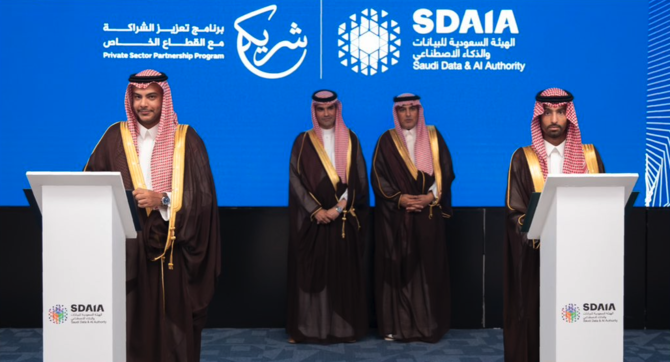RIYADH: Saudi Arabia’s private sector is set to gain a boost in AI-driven innovation and data capabilities through a new agreement aimed at accelerating digital transformation across key industries.
The new deal, signed between the Saudi Data and Artificial Intelligence Authority and the Private Sector Partnership Reinforcement Program, known as Shareek, aims to conduct comprehensive market studies and coordinate with relevant authorities, according to an official statement.
The memorandum of understanding also includes a mandate to develop AI-aligned business models and provide technical consultation services to private sector entities participating in the Shareek program.
This comes as the Gulf’s largest economy positions itself as a global AI hub under its Vision 2030 strategy, which targets $135.2 billion in economic value from the technology by the end of the decade.
The same roadmap aims to raise the private sector’s contribution to gross domestic product to 65 percent by 2030, signaling a shift toward tech-led diversification away from oil dependency.
In a post on X, SDAIA stated that the MoU also seeks to “develop investment opportunities in cooperation with relevant authorities” and to “develop business models for both parties, in accordance with established procedures.”
It added that the agreement will also focus on “identifying and prioritizing investment opportunities and providing specialized technical consultations,” as well as “sharing investment opportunities with the sector and relevant authorities to join the Private Sector Partnership Reinforcement Program – Shareek.”
Launched in 2021, Shareek is a flagship public-private partnership program aiming to unlock SR5 trillion ($1.33 trillion) in investments by 2030. It supports large Saudi companies in accelerating growth and driving economic development. Its collaboration with SDAIA highlights its role in advancing large-scale digital transformation.
The development comes as the Kingdom expands its global tech alliances, with SDAIA signing an MoU with Advanced Micro Devices, or AMD, on the sidelines of the Saudi-US Investment Forum in Riyadh in May to strengthen the AI ecosystem.
The agreement aims to develop specialized AI data centers powered by AMD technologies, supporting the Kingdom’s efforts to build a robust digital infrastructure.
These developments come as Saudi Arabia’s global AI standing continues to rise, with the Kingdom ranking third worldwide in the OECD AI Policy Observatory in December, behind only the US and the UK.

























